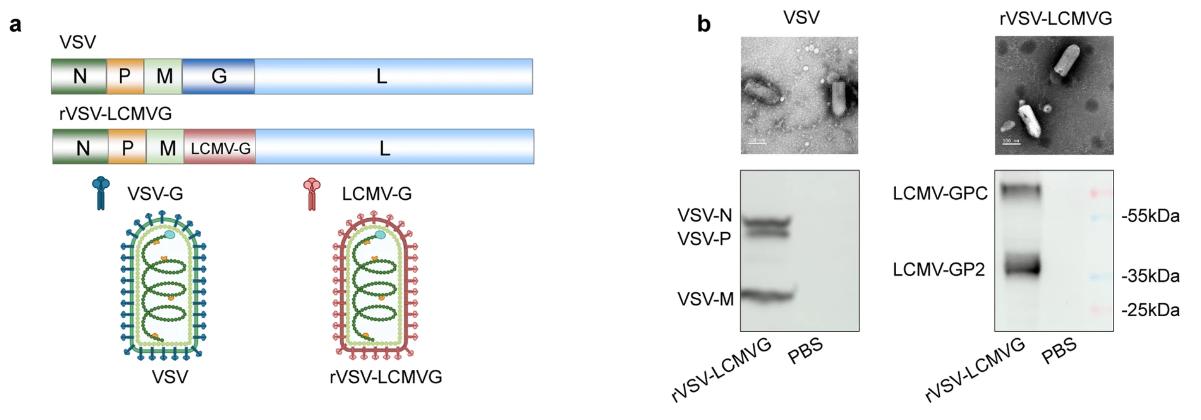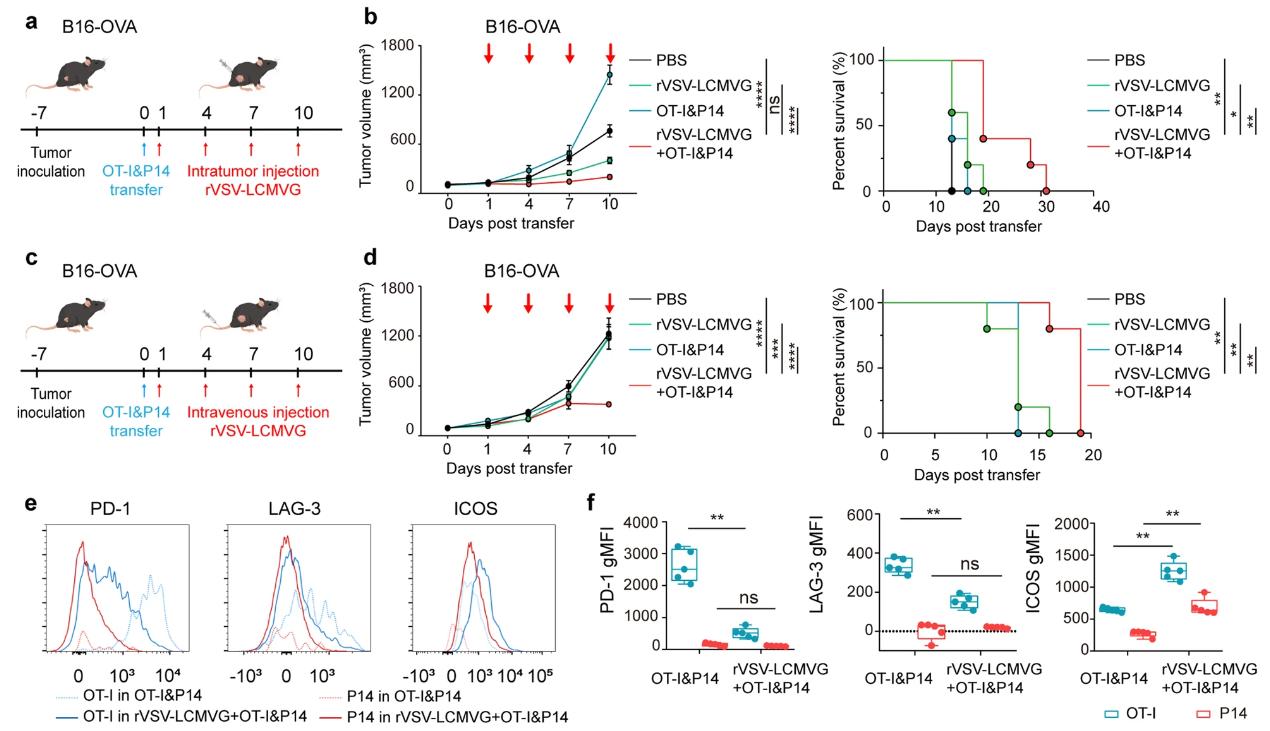Recently, Xiamen University in China published a research paper titled "Combination therapy with oncolytic virus and T cells or mRNA vaccine amplifies antitumor effects" in the journal Signal Transduction and Targeted Therapy. This study developed an oncolytic virus, rVSV-LCMVG, that is less likely to induce virus-neutralizing antibodies, and further confirmed that the oncolytic virus can enhance the anti-tumor effect when used in combination with adoptive transfer of T cells or mRNA cancer vaccines.
CAR-T cell therapy is an adoptive transfer T cell therapy that has produced impressive results in the treatment of hematological malignancies. However, CAR-T cell therapy is not effective in solid tumors, which constitute the majority of cancer types. Adoptively transferred T cells must travel a long distance to penetrate the dense and elastic matrix and establish interactions with chemokine receptors. Once T cells reach the tumor microenvironment (TME), most T cells encounter obstacles and immunosuppressive factors that impede their ability to expand, infiltrate, and induce tumor-specific cytotoxicity. The limited efficacy of T-cell-based monotherapy against solid tumors suggests the need for additional adjuvant therapies to overcome these resistance mechanisms and thereby expand adoptively transferred T-cell therapy to solid tumors.
mRNA vaccines have played an important protective role during the COVID-19 pandemic, but preventing infectious diseases is just the tip of the iceberg of their potential. There are dozens of clinical trials testing the safety and effectiveness of mRNA vaccines against a variety of cancers, including pancreatic cancer, colorectal cancer and melanoma. Clinical and preclinical trials of personalized mRNA-based cancer vaccines have shown promising results, heralding a potential shift in the cancer treatment paradigm. But mRNA vaccines cannot completely solve all the obstacles encountered in immunotherapy. These challenges include multiple immune evasion mechanisms exploited by tumor cells, interference and suppression caused by the TME, and tumor invasion and metastasis.
Oncolytic virotherapy is another promising treatment approach for solid tumors due to its selectivity, optimal immunogenicity, and ability to deliver transgenes directly to the tumor site in a targeted manner. The anti-cancer effect of oncolytic viruses (OV) is mainly achieved by directly dissolving tumor cells and antagonizing the immunosuppressive microenvironment within the tumor. In addition, oncolytic viruses can also express specific genes in the tumor environment through genetic modification, thereby enhancing their oncolytic properties and promoting anti-tumor immune responses. Although oncolytic viruses have great potential in tumor treatment and have become a new branch of tumor treatment, their clinical application still faces some challenges. In current clinical trials, intratumoral injection is considered the most effective and safe route of administration of oncolytic viruses, especially for superficial or localized tumors. Systemic drug delivery such as intravenous injection has greater clinical application prospects and commercial value, especially for the treatment of metastatic tumors.
| Cat.No. | Product Name | Price |
|---|---|---|
| OVZ00001 | RFP Reporter Oncolytic Virus - MeV | Inquiry |
| OVZ00002 | SLC5A5 Expressing Oncolytic Virus - MeV | Inquiry |
| OVZ00003 | SLC5A5/GFP Expressing Oncolytic Virus - MeV | Inquiry |
| OVZ00004 | GFP Reporter Oncolytic Virus - MeV | Inquiry |
| OVZ00005 | Luciferase Reporter Oncolytic Virus - MeV | Inquiry |
| OVZ00006 | CEA Expressing Oncolytic Virus - MeV | Inquiry |
| OVZ00007 | SLC5A5/GFP Expressing Oncolytic Virus - HSV1 | Inquiry |
| OVZ00008 | Dual Reporter Oncolytic Virus - HSV1 | Inquiry |
| OVZ00009 | GFP Reporter Oncolytic Virus - HSV1 | Inquiry |
Although oncolytic viruses have had limited success as standalone therapies, they have the potential to work synergistically with other immunotherapies, such as adoptive cell transfer therapy. Oncolytic viruses can enhance the efficacy of immunotherapy through multiple mechanisms. First, oncolytic viruses can reverse tumor immunosuppression by releasing danger signals and promoting the transport, proliferation, and persistence of T cells within the tumor microenvironment (TME). Secondly, oncolytic viruses have the ability to lyse tumor cells and release tumor-associated antigens, which helps combat tumor escape mechanisms caused by antigen loss. In addition, oncolytic viruses can also be used as vectors to deliver chemokines or cytokines to further enhance the anti-tumor function of T cells.
For these reasons, the research team speculated that oncolytic viruses could amplify the anti-tumor effects of adoptive transfer T cell therapy or mRNA cancer vaccines and tried to determine the mechanism of this synergistic effect.
In this study, the research team designed an oncolytic virus rVSV-LCMVG that is less susceptible to inducing virus-neutralizing antibodies. Vesicular stomatitis virus (VSV) is a potential oncolytic viral vector. To reduce neurotoxicity while retaining VSV's lytic activity and broad tumor affinity, the research team replaced the G protein of VSV with that of lymphocytic choriomeningitis virus (LCMV), and the modified recombinant virus was named rVSV-LCMVG.

Figure 1. Schematic of oncolytic virus rVSV-LCMVG. (Fu R, et al. 2024)
Next, the research team combined the oncolytic virus rVSV-LCMVG with adoptively transferred T cells. In B16 tumor-bearing mice, combination therapy showed superior anti-tumor effects than monotherapy by converting immunosuppressive tumor microcircles into an immune-sensitive tumor microenvironment. This enhanced effect occurs regardless of whether the oncolytic virus is administered intratumorally or intravenously. Combination therapy significantly increased intratumoral cytokine and chemokine levels and recruited CD8+ T cells into the tumor microenvironment to trigger anti-tumor immune responses. Adoptively transferred T cell preconditioning and subsequent oncolytic virus therapy sensitize refractory tumors by promoting T cell recruitment, downregulating PD-1 expression, and restoring effector T cell function.

Figure 2. Adoptive transfer of T cells combined with oncolytic viruses can improve therapeutic efficacy. (Fu R, et al. 2024)
In order to provide a combination therapy with more translational value, the research team combined the oncolytic virus rVSV-LCMVG with an mRNA cancer vaccine. The combination of oncolytic viruses and mRNA cancer vaccines also showed significant reductions in tumor burden and prolonged survival.
Overall, this study proposes a rational combination treatment plan of oncolytic viruses and adoptive T cell transfer therapy or mRNA cancer vaccines encoding tumor-associated antigens in terms of synergistic effects and mechanisms.
Reference
Fu R, et al. Combination therapy with oncolytic virus and T cells or mRNA vaccine amplifies antitumor effects. Signal Transduction and Targeted Therapy, 2024, 9(1): 118.

